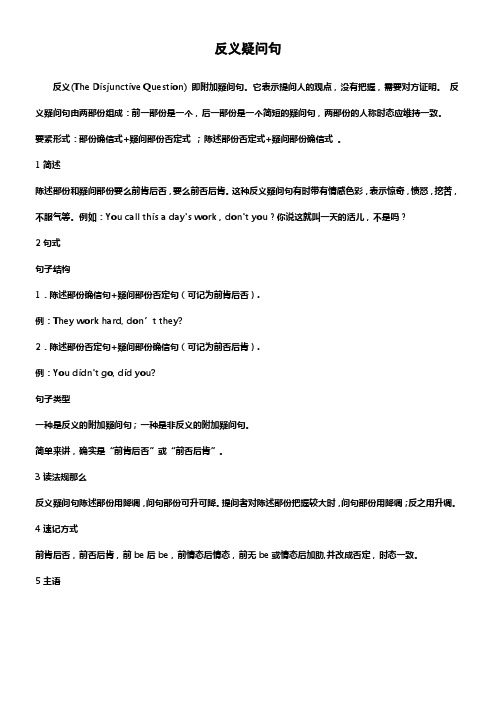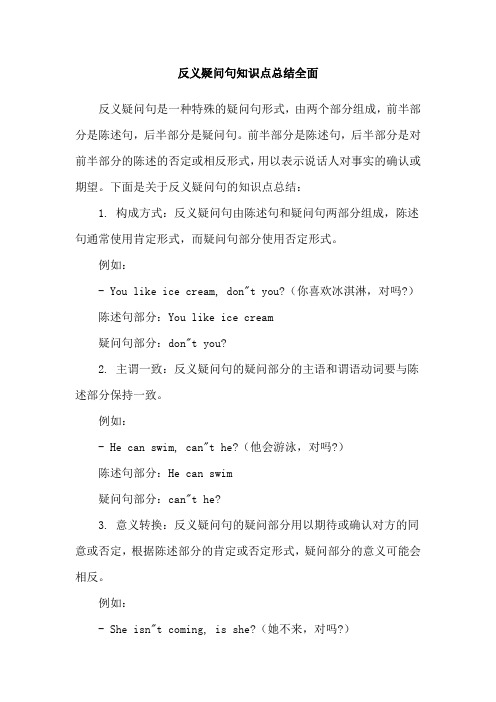反义疑问句总结
高中英语反义疑问句(详细)

反义疑问句反义(The Disjunctive Question) 即附加疑问句。
它表示提问人的观点,没有把握,需要对方证明。
反义疑问句由两部份组成:前一部份是一个,后一部份是一个简短的疑问句,两部份的人称时态应维持一致。
要紧形式:部份确信式+疑问部份否定式;陈述部份否定式+疑问部份确信式。
1简述陈述部份和疑问部份要么前肯后否,要么前否后肯。
这种反义疑问句有时带有情感色彩,表示惊奇,愤怒,挖苦,不服气等。
例如:You call this a day's work,don't you?你说这就叫一天的活儿,不是吗?2句式句子结构1.陈述部份确信句+疑问部份否定句(可记为前肯后否).例:They work hard, don’t they?2.陈述部份否定句+疑问部份确信句(可记为前否后肯).例:You didn't go, did you?句子类型一种是反义的附加疑问句;一种是非反义的附加疑问句。
简单来讲,确实是“前肯后否”或“前否后肯”。
3读法规那么反义疑问句陈述部份用降调,问句部份可升可降。
提问者对陈述部份把握较大时,问句部份用降调;反之用升调。
4速记方式前肯后否,前否后肯,前be后be,前情态后情态,前无be或情态后加助,并改成否定,时态一致。
5主语一样词语附加疑问句中用和主句一致的主语,用。
附加疑问句侍从句。
不定代词当陈述部份的主语是(1)one时,后面的可用one/he.(2)no one时,后面附加疑问句中主语用they。
(3)everything,anything,nothing,something时,附加疑问句中主语用it 不用they(4)this, that,或those, these时,附加疑问句中主语用it或they.(5)everyone,everybody,someone,somebody,anyone,nobody等时,附加疑问句中主语一样用they(口头语,非正式文体)/he(正式文体)。
反意疑问句总结

一、反意疑问句㈠ 反意疑问句的构成1、前肯,后否;2、前否,后肯。
㈡ 使用反意疑问句应注意的事项:1、have 的反问① have 作为“有”:用于肯定句时,反问可用haven ’t 或don ’t ;用于否定句时,若有助动词则用助动词反问,若无助动词用have 反问。
(has 一样的用法)② have/ has done 的反问:用have(n ’t)/ has(n ’t) (前肯后否,前否后肯) ③ have 作其他意思,反问用do(n ’t)/ does(n ’t) (前肯后否,前否后肯)2、wish 的反问只用may 的肯定式3、am 的反问① am 用于肯定句时,反问用aren ’t/ ain ’t② am not 反问用am4、dare, need 作情态动词时,反问用dare, need 反问;作实义动词时,反问用助动词反问5、there be 句型的反问用is(n ’t)/ are(n ’t) there (前肯后否,前否后肯) 注:there standthere live (用于人) there lie (横躺的) there seem to be there happen to bethere appear to be6、used to do 意为“过去常常”的反问,用didn ’t/ usedn ’t/ usen ’t7、ought to 的反问用oughtn ’t/ shouldn ’t +主语;或ought/ should +主语+not8、must 的反问① must 作“必要、必须”时,反问用 needn ’t② must 作“应该”时,反问用mustn ’t③ mustn ’t 作“禁止”时,反问用 must④ 表示现在推测:must be 反问用isn ’t/ aren ’t ; must do 反问用don ’t/ doesn ’t ⑤ must have done 的反问:有过去时间时用didn ’t看得出为完成动作用haven ’t一般(既无过去时间也看不出完成时)的反问用didn ’t/ haven ’t注:must have been done 反问用wasn ’t/ weren ’t 或hasn ’t 或两者;类推于must have done ; may, might, can, could 的反问与must 一样)9、let 祈使句反问① let ’s 用shall we② let us/ him/ her/ them, 用will you③ let me 用will you/ may I反问用do(n ’t)/ does(n ’t) (前肯后否,前否后肯)10、其他祈使句的反问①肯定祈使句的反问:表请求——will you, would you, can you, could you(念升调);won’t you 表邀请,can’t you 表不耐烦,两者都可表示提醒,该……,wouldn’t/ couldn’t 是其委婉式(念降调);②否定祈使句,反问用will you11、单个one作主语时,反问部分主语可以是one/ you,one是正式场合,you是非正式场合。
反义疑问句的用法总结简洁一点

反义疑问句的用法总结简洁一点引言:语言是人类交流的重要工具之一,其中疑问句在日常对话中占据重要地位。
而在疑问句的构成中,反义疑问句是一种常见的表达方式。
本文将就反义疑问句的定义、结构、用法及注意事项进行总结与讨论。
一、什么是反义疑问句反义疑问句(tag question)是由一个主陈述句加上一个相对应且表示相反意思的附加问句而构成的特殊语法结构。
其目的在于征求对方的同意或确认所说话者自己所知道或期待听到一个肯定或否定回答。
下面通过例句来讲解:1. You are a student, aren't you?(你是学生,不是吗?)2. He doesn't like coffee, does he?(他不喜欢咖啡,是吗?)二、构成反义疑问句的方式根据实际情况和需要使用不同形式来构建一个合适的反义疑问句。
下面列举了几种常见的方式。
1. 主动肯定 + 附加否定例如:She is a doctor, isn't she?2. 主动否定 + 附加肯定例如:You don't like ice cream, do you?3. 被动肯定 + 附加否定例如:He is loved by everyone, isn't he?4. 被动否定 + 附加肯定例如:This car hasn't been used, has it?三、反义疑问句的常见用法及注意事项反义疑问句具有广泛的用途,下面列举了一些常见的用法,同时也提到了一些应注意的细节。
1. 表示征询意见或确认:例如:Let's go to the beach, shall we?2. 表示感情或态度:例如:You love me, don't you?3. 表示礼貌和委婉:例如:Could you pass me the salt, would you?4. 强调陈述句的正确性:例如:She can speak German, can't she?5. 包含暗示或期待有关信息:例如:It's cold outside, isn't it?(预期对方给出相同观察结果)需要注意以下几点:(1)语调起伏要准确。
反义疑问句用法总结

反义疑问句用法总结一.反意疑问句的定义反意疑问句(The Disjunctive Questions )是疑问句的一种,它对陈述部分的事实提出相反的疑问,形式上是个省略句,附在陈述部分之后,并用逗号与陈述部分隔开(主语一般用相应的代词;有时这种问句并没有反意疑问句的意味,而是提出一个事实上听话人承认的问题。
所以,人们统称为附加疑问句(Tag Questions )。
附加疑问句主要是由“陈述句 + 附加疑问”构成,附加疑问部分的动词一般要与陈述部分的动词相对应,附加疑问部分的主语要与陈述部分的主语相对应,如果陈述部分的主语是名词词组,则附加疑问部分用相应的代词表示。
二.附加疑问句的类型附加疑问句的类型为:陈述句 + 反意附加疑问。
该类型又可以分为以下两种情况阐述:①当陈述句为肯定式时,附加疑问句用否定形式,即肯定的陈述句+否定的附加疑问句。
It's very hot today, isn't it ? Yes, it is . 今天天气很热,是不是?是的,很热。
That clock is slow ,isn't it? Yes, it is. 这钟是缓慢的,不是吗?是的,它是。
You want to get your TV set back , don't you ? Yes , I do. 你想您的电视机回来,不是吗?是的,我是这样想的。
②当陈述句用否定式时,附加疑问句用肯定形式,即否定的陈述句+肯定的附加疑问句。
It isn't very hot today, is it ? 今天不是很热,是吗? That clock isn't slow ,is it ? 这钟不是缓慢的,是吗?注意这一类型的附加疑问句的回答,不管问题的提法如何,若事实是肯定的,就要用yes,事实是否定的,就要用no,这与汉语不一样,应特别注意。
She isn't a teacher , is she? 她不是教师,是吗?Yes , she is. 不,她是。
反义疑问句知识点总结全面

反义疑问句知识点总结全面反义疑问句是一种特殊的疑问句形式,由两个部分组成,前半部分是陈述句,后半部分是疑问句。
前半部分是陈述句,后半部分是对前半部分的陈述的否定或相反形式,用以表示说话人对事实的确认或期望。
下面是关于反义疑问句的知识点总结:1. 构成方式:反义疑问句由陈述句和疑问句两部分组成,陈述句通常使用肯定形式,而疑问句部分使用否定形式。
例如:- You like ice cream, don"t you?(你喜欢冰淇淋,对吗?)陈述句部分:You like ice cream疑问句部分:don"t you?2. 主谓一致:反义疑问句的疑问部分的主语和谓语动词要与陈述部分保持一致。
例如:- He can swim, can"t he?(他会游泳,对吗?)陈述句部分:He can swim疑问句部分:can"t he?3. 意义转换:反义疑问句的疑问部分用以期待或确认对方的同意或否定,根据陈述部分的肯定或否定形式,疑问部分的意义可能会相反。
例如:- She isn"t coming, is she?(她不来,对吗?)陈述句部分:She isn"t coming疑问句部分:is she?4. 祈使句的反义疑问句:当陈述部分是祈使句时,疑问部分使用肯定形式。
例如:- Open the window, will you?(请把窗户打开,好吗?)陈述句部分:Open the window疑问句部分:will you?5. 对待陈述的态度:反义疑问句可以表示说话人对陈述的态度,通常用于征求对方的意见或确认,或表示说话人的不确定或怀疑。
例如:- It"s a nice day, isn"t it?(今天天气不错,对吗?)陈述句部分:It"s a nice day疑问句部分:isn"t it?总结:反义疑问句是一种特殊的疑问句形式,用于征求对方的意见或确认,或表示说话人的态度。
反义疑问句总结

英语语法——反意疑问句1) 陈述部分的主语是I,疑问部分要用aren't I.I'm as tall as your sister,aren't I?2) 陈述部分的谓语是wish,疑问部分要用may +主语。
I wish to have a word with you, may I?3) 陈述部分用no, nothing, nobody, never, few, seldom, hardly, rarely, little等否定含义的词时,疑问部分用肯定含义。
The Swede made no answer, did he / she?Some plants never blown (开花), do they ?4) 含有ought to 的反意疑问句,陈述部分是肯定的,疑问部分用shouldn't / oughtn't +主语。
He ought to know what to do, oughtn't he? / shouldn't he?5) 陈述部分有have to +v. (had to + v.),疑问部分常用don't +主语(didn't +主语)。
We have to get there at eight tomorrow, don't we?6) 陈述部分的谓语是used to 时,疑问部分用didn't +主语或usedn't +主语。
He used to take pictures there, didn't he? / usedn't he?7) 陈述部分有had better + v. 疑问句部分用hadn't you?You'd better read it by yourself, hadn't you?8) 陈述部分有would rather +v.,疑问部分多用wouldn't +主语。
初中英语语法总结:反义疑问句

句初中英语疑问结:反义法总种句子叫做句,这在陈短问述句之后加上一个意思与之相反的简成,在前一部分由意思相反的两部分组反意疑问句。
反意疑问句必须(陈述句) 之后用逗号,后一部分(简短问句) 之后用问号。
反意疑问句用人称代词必须,不能用名用缩的否定句必须略形成,同时它的主语词。
前一部分用降调,后一部分在表示疑问时用升调,在表示强调某。
用降调意思时:两类句分为反意疑问1. 前一部分为肯定式,后一部分是否定式。
2. 前一部分为否定式,后一部分是肯定式。
陈述句( 肯定式) ,+疑问部分( 否定式)?1.be动词和一般动词(实义动词)构成的反意疑问句be动词句型:现在→⋯,isn't(aren't)+ 主语?过去→⋯,wasn't(weren't)+ 主语?词句型:一般动现在→⋯,don't(doesn't)+ 主语?过去→⋯,didn't + 主语?The pen is yours ,isn't it?这笔是你的,不是吗?Lucy likes English ,doesn't she??,不是吗英语路希喜欢Yes,she does. 是的,她喜欢。
No,she doesn't. 不,她不喜欢。
That was a wonderful night ,wasn't it?那是个奇妙的夜晚,不是吗?Yes,it was. 是的,它是。
No,it wasn't. 不,它不是。
Your sister helped him ,didn't she?你姐姐协助了他,不是吗?Yes,she did. 是的。
她协助他。
No,she didn't. 不。
她没有协助他。
注意反意疑问句中,前后两部分的动词在人称、数和时态上通常保持一致。
另外后一部分的人称代词应和前一部分的主语( 名词或代词) 保持一致。
Tom is skating ,isn't he?( 实行时)汤姆在滑冰,不是吗?Yes,he is. 是的。
反义疑问句句型归纳

反义疑问句句型归纳-标准化文件发布号:(9556-EUATWK-MWUB-WUNN-INNUL-DDQTY-KII反义疑问句句型归纳1、You had no time for reading, did you\ had you?2、He has a bro ther, hasn’t he, \ doesn’t he?3、We have to go without him, don’t we4、You have you r dinner at school, don’t you?5、He has a res t every two hours, doesn’t he?6、This is your last chance to learn from the beginning, isn’t it?7、Those were terrible days f or us to recall, weren’t they?8、There are some books you ar e interested in, aren’t there?9、Let us do it as we please \ like to, will you \ can you10、Let’s us do it right now, shall we \ can we11、Come here, will you\ won’t you \ can you \ c an’t you \ do you \ don’t you?12、Don’t say anything, will you \ can you \ do you13、Tom, you clean the window, will you?14、I think \ say \suppose \ guess \ am sure he will come back soon, won’t he?15、I don’t think he will come back , will he?16、He old man never thought he was lonely, did he?17、The old man used to be a f armer, usedn’t he \ didn’t he?18、He ought to come, oughtn’t he \ shouldn’t?19、He seldom goes to the cin ema, doesn’t he?( hardly, never, few, little, nothing, nobody)20、It’s unfair, isn’t it?21、One can’t be car eful enough, can one \ can he?22、Eve rything goes well, doesn’t it?23、Everybody agrees with him, doesn’t he \ don’t they?24、All we needed has bee n bought, hasn’t it?25、All we invited have arrived, haven’t they(All refers to people)26、Learning E nglish is very hard, isn’t it?27、He studies hard and he is often prai sed by his teachers, isn’t he?28、We must be more polite in this occasion, needn’t w e?29、He must be a brave man, isn’t he?30、It must have rained last night, didn’t it?31、He mush hav e known the answer, hasn’t he?32、He can’t have done such a foolish thing, has he?33、I am a student, aren’t I34、So he has known the secret, has he?35、Oh, you have the same type of sell phone as I, do you一、反意疑问句的意义及其构成反意疑问句又叫附加疑问句,是指当提问的人对前面所叙述的事实不敢肯定,而需要向对方加以证实时所提出的问句。
- 1、下载文档前请自行甄别文档内容的完整性,平台不提供额外的编辑、内容补充、找答案等附加服务。
- 2、"仅部分预览"的文档,不可在线预览部分如存在完整性等问题,可反馈申请退款(可完整预览的文档不适用该条件!)。
- 3、如文档侵犯您的权益,请联系客服反馈,我们会尽快为您处理(人工客服工作时间:9:00-18:30)。
一、附加疑问部分的主语及谓语的确定
1.当陈述部分的主语是this, that 时,疑问部分用
it; 当陈述部分是these, those时,疑问部分用they. 如:
This is a beautiful picture, isn’t it?
These books are Lily’s, aren’t they?
2.There be 结构的反意疑问句,后边的疑问部分
仍用there be形式。
如:
There is a book on the desk, isn’t there?
3.当陈述部分有表示否定意思的词,例如:few,
little, no, nothing, nobody, never, none, hardly(几乎不), too…to等,疑问部分用肯定。
There is no student in the classroom, is there?
There are few people in the room, are there?
4.当陈述部分含有由否定前缀或否定后缀构成的
单词,疑问部分用否定。
He dislikes music, doesn’t he?
She feels helpless, doesn’t she?
5.如果陈述部分的主语是指人的不定代词
everyone, someone, no one, somebody, anybody, everybody , 疑问部分可用he 或they. Somebody wants to see you, doesn’t he (don’t they)?
6.当陈述部分的主语是指物的不定代词
something ,anything, everything, nothing 时,疑问部分用it.
Something is wrong with your computer, isn’t it?
7.当陈述部分为I am 形式时,疑问部分用
aren’t I.
I’m right, aren’t I?
8.肯定的祈使句的疑问部分用will you 或won’t
you, 否定的祈使句的疑问部分用will you. Listen to me carefully, will you (won’t you)?
Don’t turn off the light, will you?
9.以Let’s 开头的祈使句,用shall we; 而以Let us
开头的祈使句用will you.
Let’s go to the park, shall we?
Let us help you, will you?
10.当陈述部分动词为have (has), 有以下几种情
况:
1)have/has 在一般现在时中表示“有”之意,疑问部分谓语可用have/has, 也可用助动词do/does. 如:
Tom has a new watch, hasn’t / doesn’t he?
2) have/ has/ had to 表示“不得不、必须”等意思时,疑问部分动词用助动词do/does/did. 如:
Kate has to help her mother at home, doesn’t she?
3) have/ has/ had 表示“吃、喝、玩、度过“等意思时,疑问部分动词用do/does/did. 如:
They had a good time in Beijing, didn’t they?
4) had better 表示“最好“之意,当其用在陈述部分时,疑问部分动词用had, 如:
We’d better stop talking, hadn’t we?
5) have/has/had 用在完成时态中,疑问部分动词应用have/has/had, 如:
Lucy has ever been to Japan, hasn’t she?
11.陈述部分为主从复合句的时候,一般与主句的
主语、谓语保持一致,但I don’t think/I don’t believe等否定转移的句子则与从句一致,如:He said that his sister was right, didn’t he?
I don’t think he is right, is he?
12.陈述部分含有情态动词must时,有下列几种情
况:
1)must表示“必须”之意,疑问部分用needn’t.
如:
They must come on time, needn’t they?
2)must表示推测,“一定,想必”之意,疑问部分的谓语动词应根据must后面的动词确定,如:That man must be Mr. Wang, isn’t he?
二、练习题
1.You bought a new computer last week, ____you?
A.aren’t
B. don’t
C. didn’t
D. haven’t
2.—Mr. Wang’s never been to Canada, has he?
—_____. He went there on business last week. A.No, he hasn’t B. Yes, he has C. No, he has D. Yes,
he hasn’t
3.—Li Mei usually helps others, _____?
—Yes, she is kind-hearted.
A.does she
B. is she
C. doesn’t she
4.They came here to have a meeting on time, ____?
A.didn’t they
B. did they
C. don’t they
D. do they
5.The boy has a new MP4,______?
A.doesn’t he
B. isn’t he
C. does he
D. is he
6.Alice had a wonderful time yesterday,_____?
A.hadn’t she
B. wasn’t she
C. didn’t she
D. wouldn’t
she
7.Our hometown is more beautiful than before,
_____?
A.isn’t it
B. is it
C. doesn’t it
D. does it
8.Don’t forget to put the book back on the shelf,
______? A.do you B. don’t you C. will you D. won’t you
9.—Let’s go and play football,_____?
—That’s wonderful.
A.will you
B. do you
C. won’t we
D. shall we
10.—You don’t come from America, do you?
—_____. I come from England.
A.No, I do
B. Yes, I do
C. Yes, I don’t
D. No, I don’t
11.—He’s never stolen anything before, _____he?
—_____. It’s his third time to be taken to police station.
A.hasn’t; Yes
B. is; Yes
C. has; Yes
D. has; No
12.Don’t forget to give the baby some food or
drinks,____?
A.will you
B. shall we
C. won’t you
D. do you
13.His sister had a bad cold, ______she?
A.wasn’t
B. doesn’t
C. hadn’t
D. didn’t
14.—It’s time to go to bed. You have to get up early
tomorrow, ______?
—Yes, my class is going hiking tomorrow.
A.can’t you
B. don’t you
C. aren’t you
D. haven’t
you
15.He has few friends in the new school, _____?
A.has he
B. is he
C. doesn’t he
D. does he
16.She’s an Australian, ______?
A.hasn’t she
B. isn’t she
C. doesn’t she
D. wasn’t
she
17.There will be a football match in our school,
_____?
A.be there
B. is there
C. will there
D. won’t there。
